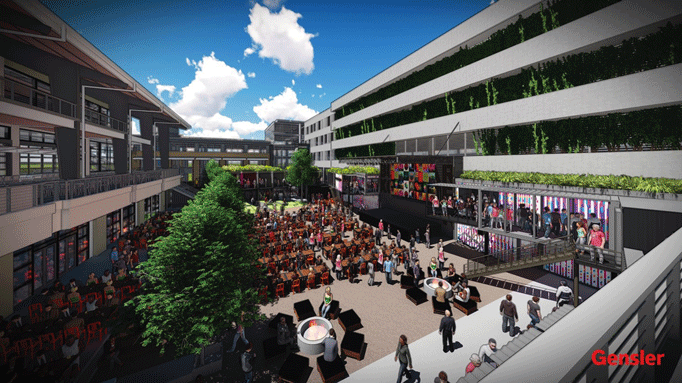
As far as Dallas restaurateur Randy DeWitt is concerned, the term “food court” is unsuited to any discussion about the European-style food-hall concept he is bringing to the U.S. culinary scene. DeWitt’s Front Burner Restaurants LP, known for the Whiskey Cake Kitchen & Bar and Velvet Taco brands, is developing a 55,000-square-foot concept called Legacy Hall, in the center of The Karahan Cos.’ huge Legacy West development, in Plano, Texas. The food hall as a concept is not new to the U.S., as star chefs Mario Batali and Anthony Bourdain have both embraced it. But DeWitt’s markedly different approach bears watching, particularly since he plans to expand his concept into more markets.
Q. What inspired you to import this concept?
A. I have always been very curious about what makes people eat certain foods and go to certain restaurants, and I made a career out of developing restaurant concepts. About 18 to 20 months ago, I found myself in Amsterdam, and a brand-new food hall called Foodhallen had just opened up. Simultaneously, Fehmi Karahan, the developer of the Shops at Legacy and now Legacy West, was challenging me to come up with something unusual, really creative and different that could be the centerpiece for his new project. I just had this epiphany and thought we could do this back home.
Q. What restaurateurs will be featured?
A. By nature, the food halls we are going to create are not food courts. There are no national franchise chains. We are not seeking out multiunit operators who are going to open up a stall in every food hall in America. We want local — we want our food halls to be a mirror image of what is going on in the local culinary scene of that market. In Dallas we are inviting all of the local chefs that are popular right now. We are also open to some young entrepreneur who has a big idea. The food hall is the place for that young entrepreneur and food artist to come in and express himself. The stalls are going to cost from $50,000 to $75,000. A lot of young startup entrepreneurs have access to that level of money, or they can get it from a family member or a close friend who is not going to squash their spirit. But if they don’t, we have a captive finance entity within our company [such] that if we believe in them strongly enough and want them in the food hall, we will finance them ourselves. We are aiming for 22, and it will either go up or down slightly, but not much.
Q. How did you obtain financing?
A. Luckily, our landlord believes so strongly in the project that a lot of the funding came as sort of a build-to-suit. One of the things we learned was that food halls are tough to finance, because the typical approach is from the real estate perspective of, “I am going to take this big building and chop it into small spaces and rent it out to people who are startup operations” — but they don’t have any credit and they don’t have much experience. We created a business model that worked for everybody and is a nice balance, but it is not the standard approach.

